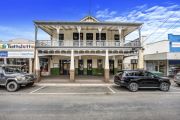
CBRE writes $1.5 billion in commercial loans in 2016
The private non-bank lending sector continues to boom in Australia as commercial investors take out $1.5 billion in long-term debt with global real estate agency CBRE.
In the residential sector, many cashed up private lenders have emerged to “bail out” developers and apartment buyers.
Alternative, or third-tier, lenders or funders such as Balmain Group, Centaur and Chifley Securities have provided construction and development loans to apartment developers who have been rejected by banks, because they had little development experience or did not have enough pre-sales.
Funders such as Development Finance Partners or Mortgage Ezy offer foreign buyers, particularly those from China who were unable to transfer money, funds to settle apartment purchases.
CBRE has found another gap left by banks – long term commercial loans.
The agency has financed overseas investors, real estate investment trusts, syndicators or investment vehicles with debt of up to 10 years to fund their commercial purchases of office, retail or industrial assets.
In 2016 CBRE wrote $35.9 billion in loans globally, with $1.5 billion from Australia. Most of these loans were in the US.
“We can certainly see demand of over $1 billion a year into the future,” CBRE Capital Advisors Asia Pacific Martin Priestley said.
“That is a result of a combination of banks tightening and borrowers wanting long-term debt. There’s plenty of appetite, we are speaking to people all the time. Banks themselves are relatively short-term funded and so they can only go so far.”
CBRE’s point of difference is in the provision of long-term debt compared with banks which usually provide commercial loans up to 3 years with interest rates in the mid 4 per cent.
CBRE might charge about 5 per cent, but what it provided investors was a longer-term debt and therefore less re-negotiation for investors over the life of the investment. Loan-to-value ratios were also higher at 60 to 65 per cent compared with banks at 50 to 55 per cent.
The biggest loan issued so far was $250 million for 10 years and the providers of these loans were mostly global and domestic life companies and pension funds, Mr Priestley said.
The global search for yield, amid low interest rates, has given rise to demand for property investments especially in stable countries like Australia.










